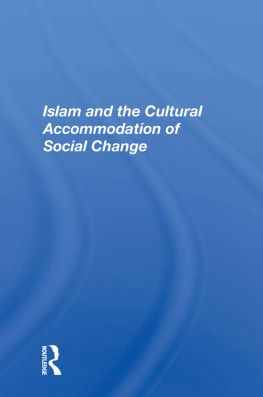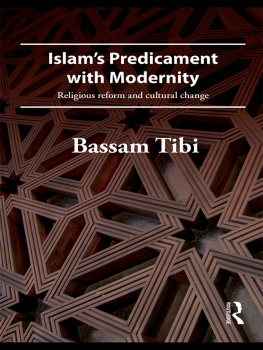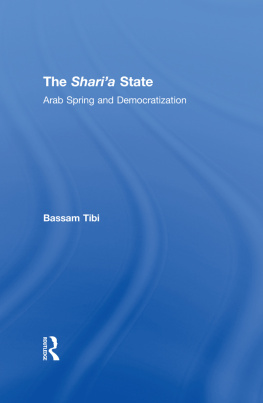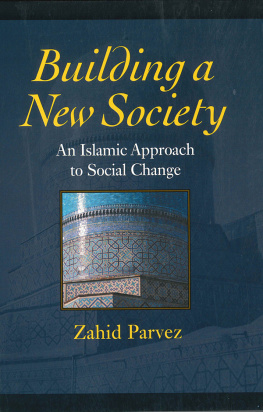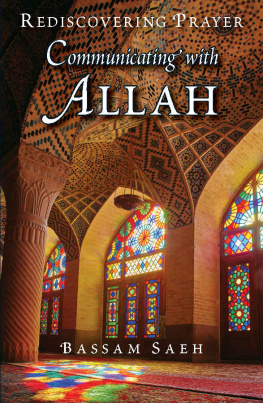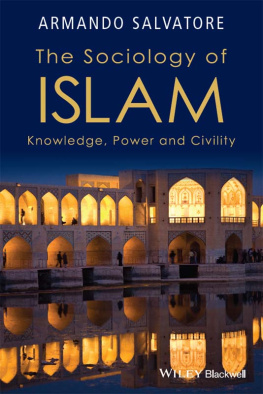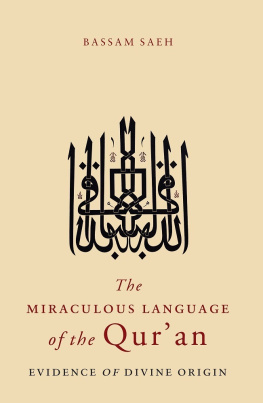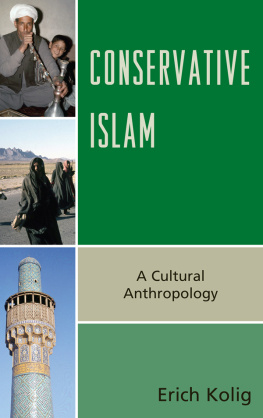This book was initially planned as an English translation of my German book Der Islam und das Problem der kulturellen Bewltigung sozialen Wandels. Thanks to the Harvard Center for Middle East Studies and its director, Professor Roy Mottahedeh, who jointly with the Harvard Center for International Affairs provided me in the academic year 1988/ 89 with an affiliation as a research associate, the translation acquired through reworking a new form and improved quality. At Harvard I had the necessary time and research facilities to do this job in addition to working on my chapter for Tribes and State Formation in the Middle East (Philip Khoury and Joseph Kostiner, eds., 1990). I not only thoroughly checked the translation by Dr. Clare Krojzl but also revised the text and updated it together with the notes. In addition, I ventured into largely rewriting and reformulating the earlier text, originally completed in 1984 and published in German in 1985. While I was carrying out this difficult job, Dr. Krojzl assisted me cooperatively by integrating all my revisions and changes to the manuscript into her translation.
The basic framework of this inquiry into Islam is the concept of religion as a cultural system in the Geertzian sense. Religion, thus conceptualized as a source of cultural patterns, has an intrinsically dual aspect. The cultural patterns related to it "give meaning, that is, objective conceptual form, to social and psychological reality both by shaping themselves to it and by shaping it to themselves" (Clifford Geertz, The Interpretation of Cultures, New York: Basic Books, 1973, p. 93). The interplay between social and cultural change lies at the heart of this book. This interplay cannot be grasped adequately if one pattern of change, be it the social or the cultural, is reduced to the other. A deeper insight into the complexity of this interplay calls for wariness of reductionism. This book represents an effort toward that end.
The methodological requirement for the proposed analysis having been outlined, the focal question formulated and dealt with in disruptive social change taking place in the "abode of Islam" under the present conditions of being integrated into the global society?
I conclude with reflections on intercultural communication structures in today's worldwhich constitutes a global society at the level of socioeconomics, transport, and communication but not, however, at the level of its culture. There is a simultaneity of unified political and socioeconomic structures and of cultural fragmentation. I deal with the question of which models of interaction dominate current intercultural communication structures and in which direction they could develop in the future, in view of non-Western peoples' current cultural dissociation from the present global society.
This book reflects an integral part of the many years I have spent researching and studying the Islamic culture in which my own primary education took place and in relation to which, thanks to my Western academic education, I have by now acquired a discernible distance. The manuscript of the original German version took shape between spring 1983 and autumn 1984 and reached completion in October 1984. The rewriting of the book was pursued at Harvard in the spring term of 1989- In the rewritten Introduction I outline, in addition to the structural content of the book, the basic development of ideas leading from what was, seen from my present perspective, my first, "immature" book, Die arabische Linke (The Arab Left, 1969), through three other monographs to the present work.
Since the publication of the first U.S. and British edition of my book Arab Nationalism (2d ed., forthcoming, 1990), as well as Krise des modernen Islams (Crisis of Modern Islam, U.S. ed., 1988), both in 1981, I have had the good fortune to free myself from the confines of German scholarship and become integrated into a rather international communication network, from which this book has benefited greatly. The list of people to whom I am indebted is very long, and I have been obliged to restrict the Acknowledgments solely to those who have contributed to the book directly. Of course, any errors contained in it are my responsibility alone.
As always, my deepest gratitude goes to my beloved wife, Ulla, to whom this book is dedicated. She has had to put up with my absences during frequent research trips abroad (1980-1985) in connection with my work for this book, and she at various stages has read the manuscript critically and made helpful comments during the period when I was still working out the findings of my research in Gttingen. Fortunately Ulla was able to obtain leave and join me at Harvard during the spring term of 1989 while I was preparing this edition. It is likewise to her that I owe the profound realization that one can be an active scholar and still enjoy life.
Bassam Tibi
Harvard University
Center for Middle East Studies
Cambridge, Massachusetts
Heading the list of people to whom I owe a debt of gratitude with regard to both the German and U.S. editions of this book, aside of course from my own very dear wife, are two editors and a publisher. Friedhelm Herborth, editor of Suhrkamp Press in Frankfurt, was tireless in his encouragement of my idea to continue with the type of social theory-oriented research on Islam that is documented in my 1981 book Krise des modernen Islams. He also made possible the publication of the results of my work by Suhrkamp in his prestigious book series. The other editor is Barbara Ellington of Westview Press, whom I first met during the annual meeting of the Middle East Studies Association (MESA) of North America in Boston in 1986 and who later became a friend. She arranged a meeting with Fred Praeger in Washington, D.C., in January 1987 at which Fred promised to consider a U.S. edition of the book. He went on to make a commitment, during the 1988 MESA meeting in Los Angeles, for Westview Press to publish it.
The scholarly background of this book comprises three culturally different worlds: Its scope extends from Europe, in particular Germany, to the Middle East, the hub of the so-called World of Islam, as well as to North America, where I have been fortunate enough to establish most beneficial scholarly networks. Since the early 1980s my life has embraced all three worlds.
I am greatly indebted to two colleagues in Gttingen from whom I have learned a great deal: Professor Gustav Ineichen, a linguist, read the chapter on the relationship between language and social change and enriched my analysis with numerous suggestions. Professor Ralf Dreier from the law school of Gttingen read the chapter on Islamic law, urged me to undertake a further revision of the text, and enhanced my thinking with his valuable jurisprudential comments.
Among the very few German colleagues to whom I am indebted are Professor Gerhard Grohs of Mainz University and Professor Theodor Hanf of Freiburg University. Both read chapters of the book and made invaluable suggestions. After completing the revised manuscript I traveled to San Francisco to take part in the eighteenth annual MESA , the reader will see the extent to which I have been influenced intellectually by the work of Reinhard Bendix.

